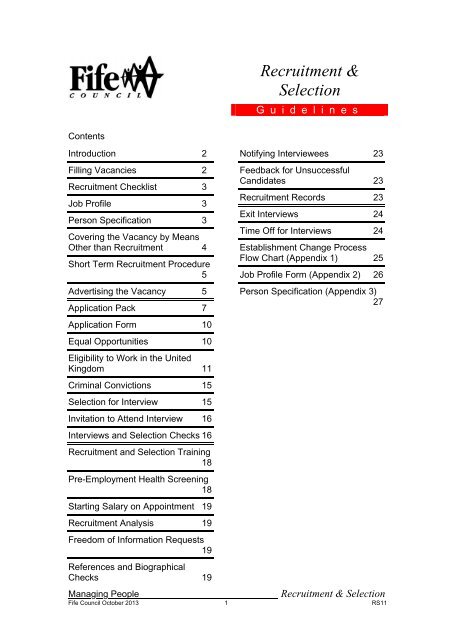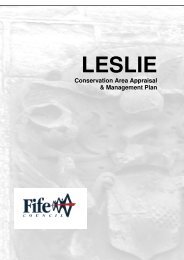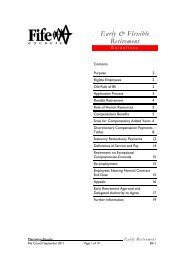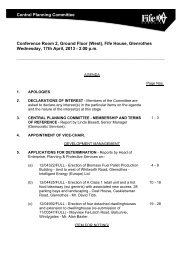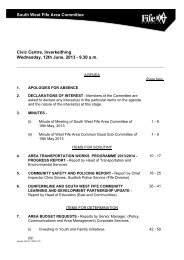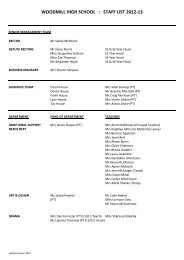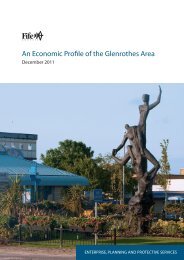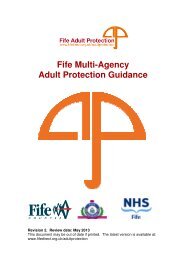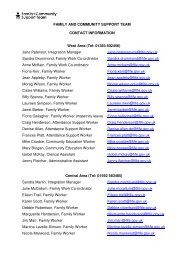Recruitment & Selection - Home Page
Recruitment & Selection - Home Page
Recruitment & Selection - Home Page
Create successful ePaper yourself
Turn your PDF publications into a flip-book with our unique Google optimized e-Paper software.
<strong>Recruitment</strong> &<br />
<strong>Selection</strong><br />
G u i d e l i n e s<br />
Contents<br />
Introduction 2<br />
Filling Vacancies 2<br />
<strong>Recruitment</strong> Checklist 3<br />
Job Profile 3<br />
Person Specification 3<br />
Covering the Vacancy by Means<br />
Other than <strong>Recruitment</strong> 4<br />
Short Term <strong>Recruitment</strong> Procedure<br />
5<br />
Advertising the Vacancy 5<br />
Application Pack 7<br />
Application Form 10<br />
Equal Opportunities 10<br />
Eligibility to Work in the United<br />
Kingdom 11<br />
Criminal Convictions 15<br />
<strong>Selection</strong> for Interview 15<br />
Invitation to Attend Interview 16<br />
Interviews and <strong>Selection</strong> Checks 16<br />
<strong>Recruitment</strong> and <strong>Selection</strong> Training<br />
18<br />
Pre-Employment Health Screening<br />
18<br />
Starting Salary on Appointment 19<br />
<strong>Recruitment</strong> Analysis 19<br />
Freedom of Information Requests<br />
19<br />
References and Biographical<br />
Checks 19<br />
Managing People<br />
Notifying Interviewees 23<br />
Feedback for Unsuccessful<br />
Candidates 23<br />
<strong>Recruitment</strong> Records 23<br />
Exit Interviews 24<br />
Time Off for Interviews 24<br />
Establishment Change Process<br />
Flow Chart (Appendix 1) 25<br />
Job Profile Form (Appendix 2) 26<br />
Person Specification (Appendix 3)<br />
27<br />
<strong>Recruitment</strong> & <strong>Selection</strong><br />
Fife Council October 2013 1 RS11
Introduction<br />
In Fife Council the supervisor or manager responsible for the job which is<br />
being recruited to has much of the responsibility for the recruitment and<br />
selection process.<br />
These guidelines are designed to help Services meet the guiding principles<br />
set out in the <strong>Recruitment</strong> and <strong>Selection</strong> Policy. The policy is linked closely to<br />
the Council’s Equality of Opportunity Policy. We follow the aims of the<br />
Equality of Opportunity Policy when recruiting to ensure that we access the<br />
fullest possible range of talents and abilities within our Community. This helps<br />
us ensure that we recruit the right people.<br />
Centralised <strong>Recruitment</strong> Team<br />
Administration of recruitment advertising through to appointment has been<br />
centralised. The document RS26 A Guide to the <strong>Recruitment</strong> Process and the<br />
HR Direct <strong>Recruitment</strong> Team gives details of the procedures to be used.<br />
Further Reading and Assistance<br />
EO01 Equality of Opportunity Policy and EO11 Equality of Opportunity<br />
Guidelines<br />
For further information contact the HR Direct <strong>Recruitment</strong> Team.<br />
Filling Vacancies<br />
Before creating a new job or when a job becomes vacant, consider how the<br />
vacancy will be filled or if it needs to be filled at all. If a job does not need to<br />
be filled tell the employees affected by the decision, or their Trade Union<br />
Representatives, and HR Direct. Further guidance can be sought from the HR<br />
Direct <strong>Recruitment</strong> Team.<br />
A job becoming vacant is an opportunity to review the job requirements and<br />
the duties attached to it. Where there are major changes to a job discuss this<br />
with the Trade Union representatives for your Service or Section and HR<br />
Direct.<br />
Establishment Change Form<br />
To get a new job, or a significant change to an existing job, approved the<br />
Establishment Change Form must be completed (RS60 Establishment<br />
Change Form) and sent to Human Resources. Once the post has been<br />
evaluated, the financial implications can be assessed by Finance before<br />
authorisation by the relevant senior manager or Head of Service. Allow time<br />
for the various parties to complete this process. It is likely to take a minimum<br />
of 26 days before the advert is published. The Establishment Change<br />
Process Flow Chart (Appendix 1) shows who is involved, when, and how<br />
long it will take them to complete their part of the process.<br />
Adverts must not be sent to the <strong>Recruitment</strong> Administration Team until all the<br />
signatures giving authorisation are obtained.<br />
Managing People<br />
<strong>Recruitment</strong> & <strong>Selection</strong><br />
Fife Council October 2013 2 RS11
<strong>Recruitment</strong> Checklist<br />
There are many stages in the recruitment and selection process and it is<br />
fundamental that keep evidence that each stage has been completed. The<br />
<strong>Recruitment</strong> Checklist is therefore vital in keeping track of the recruitment<br />
exercise (RS50 <strong>Recruitment</strong> Letters and Forms).<br />
The <strong>Recruitment</strong> Checklist will also be scrutinised by external regulatory<br />
bodies when they carry out inspections of the Council’s recruitment &<br />
personnel files.<br />
To ensure a corporate approach, the <strong>Recruitment</strong> Checklist must be<br />
completed for every recruitment exercise. The form includes all mandatory<br />
information that is required to comply with legislation, policy and procedures,<br />
and must be completed in full. Whilst this form is mandatory, it has the<br />
flexibility to be tailored to individual Services (fields named ‘other’ can be<br />
replaced with service specific checks).<br />
Job Profile<br />
All recruitment exercises begin with an up to date job profile. The job profile is<br />
vital to the success of the recruitment exercise. It sets out clearly the duties<br />
and responsibilities that the jobholder will have. It is also one of your main<br />
tools for selling the job to potential applicants.<br />
The job profile helps to ensure there is no doubt or ambiguity about the<br />
requirements of the job.<br />
A template for a job profile form is attached Job Profile Form Template<br />
(Appendix 2).<br />
Person Specification<br />
The person specification is the next step after the job profile has been<br />
completed. You should prepare it before the advert.<br />
A good person specification will ensure that there is no doubt about what<br />
attributes a person will need to be successful in the job. This will minimise<br />
subjectivity during recruitment and selection. The person specification is<br />
crucial to the success of the recruitment exercise and in avoiding<br />
subconscious bias.<br />
The requirements identified in the person specification will form part of the<br />
advert. It is used to help select the best applicants for interview and to select<br />
the best interviewee to be appointed.<br />
The person specification defines the essential and desirable criteria required.<br />
It lists how these can be assessed e.g. from the application form, the<br />
interview, aptitude tests, work sample, group exercises or in-tray exercises.<br />
Characteristics, qualities and competencies included in the person<br />
specification as requirements to do the job, should be set out clearly and<br />
precisely. The requirements must be those which are currently necessary to<br />
do the job. Do not just copy the requirements that were used the last time the<br />
post was advertised without asking whether they are still relevant. Using an<br />
out of date person specification may discriminate against women, ethnic<br />
Managing People<br />
<strong>Recruitment</strong> & <strong>Selection</strong><br />
Fife Council October 2013 3 RS11
minorities, disabled people, older people and those with non-traditional but<br />
valid experience. This is illegal. By excluding unnecessary requirements we<br />
avoid being unfairly discriminatory.<br />
You must ensure that you are not too restrictive. This could also cause<br />
unlawful indirect discrimination. For example seeking lengthy experience can<br />
be discriminatory to people who have taken time away from work for childcare<br />
responsibilities. Experience of a particular kind of work is only one way of<br />
developing the skills required. Skills developed in other types of work,<br />
voluntary work, or in organising a family may be just as relevant to the role.<br />
These dangers are minimised when the person specification is written by<br />
referring to the job profile therefore linking it to the needs of the job.<br />
The person specification includes a standard health related essential criteria<br />
for every post in the Council – this should not be removed. Additional criteria<br />
can be added if applicable to a specific post, however Services should contact<br />
the HR Direct <strong>Recruitment</strong> Team for advice to ensure that criteria are not<br />
contrary to the Disability Discrimination Act.<br />
A template for the Person Specification is attached (Appendix 3).<br />
Covering the Vacancy by Means Other than <strong>Recruitment</strong><br />
If the vacancy will last for four months or less it may be appropriate to fill the<br />
gap by secondment, acting up or redistribution of the work. In the case of<br />
secondment or acting up, an advert may not be necessary provided that you<br />
are satisfied that you are aware of all the employees who may be interested.<br />
Where it is decided that an advert is not necessary the rest of the procedures<br />
detailed in this guidance would normally be applied e.g. interested employees<br />
would still be interviewed before an appointment. The recruitment analysis<br />
and interview assessment forms should be completed as fully as possible.<br />
If only one employee meets the requirements of the job, or only one employee<br />
is interested, a meeting with the employee must be held in order that he or<br />
she is made fully aware of the duties and responsibilities of the job.<br />
When considering potentially interested employees you should also consider<br />
the possibility that there may be experienced and qualified people outside<br />
your own Section or Service.<br />
Caution needs to be exercised when considering not advertising a job. There<br />
is a potential conflict with equality of opportunity when not opening up job<br />
opportunities.<br />
When you consider that a job does not need to be filled in the normal manner<br />
this should be discussed with the HR Direct <strong>Recruitment</strong> Team and the Trade<br />
Union representatives for your Section or Service.<br />
Further Reading and Assistance<br />
TC01 Fife Council Single Status Terms and Conditions (<strong>Page</strong> 10 Higher<br />
Duties Allowance.)<br />
Managing People<br />
<strong>Recruitment</strong> & <strong>Selection</strong><br />
Fife Council October 2013 4 RS11
Short Term <strong>Recruitment</strong> Procedure<br />
The Short Term <strong>Recruitment</strong> Procedure provides a fast track recruitment<br />
option which is normally a more cost effective alternative to recruitment<br />
agencies. Jobcentre Plus use their client database to identify a suitable short<br />
list to fill the vacancy. Managers will then interview and select as normal.<br />
This procedure can be used where there is an urgent short-term need to fill a<br />
post vacant up to maximum of 26 weeks. Such situations could be:<br />
• Short term workload problems<br />
• Cover for absence<br />
• A short term project<br />
• Cover while a longer term or permanent post is advertised<br />
For further guidance refer to RS14 Short Term <strong>Recruitment</strong> Procedure<br />
Manager’s Guidance.<br />
Advertising the Vacancy<br />
The advert is based on information contained in the Job Profile and Person<br />
Specification and should be written after these have been finalised.<br />
For advice on writing recruitment adverts and details of the corporate<br />
advertising style see the guide: RS21 How to Write a Full Text <strong>Recruitment</strong><br />
Advert.<br />
The main purpose of a recruitment advert is to attract suitable candidates to<br />
the organisation and to the post. The following procedure must be followed<br />
when advertising a vacancy:<br />
Standard <strong>Recruitment</strong> Procedure<br />
All recruitment adverts are placed in:<br />
• FISH - the Council's intranet<br />
• fifedirect - the Fife community partners' website<br />
• myjobscotland – the national recruitment portal<br />
• Weekly Vacancy Bulletin, which is circulated within the Council, and to<br />
community partners<br />
• JobcentrePlus offices and website<br />
A full text advert will be required for the above sources, please refer to the<br />
guide: RS21 How to Write a Full Text <strong>Recruitment</strong> Advert.<br />
The document RS26 A Guide to the <strong>Recruitment</strong> Process and the HR Direct<br />
<strong>Recruitment</strong> Team gives details of the procedures to be used.<br />
External Advertising Requests<br />
If, following 2 weeks of advertising in the above sources the response is<br />
unsatisfactory, Services may make a request to advertise the vacancy<br />
externally via local/national press or another online source.<br />
Before making a request, an analysis of the response to the initial advert must<br />
be conducted and the HR Direct <strong>Recruitment</strong> Team contacted for media<br />
Managing People<br />
<strong>Recruitment</strong> & <strong>Selection</strong><br />
Fife Council October 2013 5 RS11
advice. Following this, an External <strong>Recruitment</strong> Advertising Request Form<br />
(RS50 <strong>Recruitment</strong> Letters and Forms) should be completed and authorised<br />
by a Senior Manager/Head of Service. Please refer to the guide: RS22 How<br />
to Request an External <strong>Recruitment</strong> Advert.<br />
Adverts placed in local/national press should match the portal advert and<br />
include:<br />
• Job Title<br />
• Salary or Wage<br />
• Hours of work & weeks per year<br />
• Work location<br />
• If the post is temporary<br />
• PVG/Disclosure and/or professional registration requirements (if<br />
appropriate)<br />
• How to apply via the recruitment portal<br />
• Reference number and closing date.<br />
Advice on the advert copy should be sought from the HR Direct <strong>Recruitment</strong><br />
Team.<br />
Internal Only Vacancies<br />
There will be circumstances where it is appropriate to restrict a job to only<br />
internal candidates.<br />
Vacancies advertised as ‘internal applicants only’ allow applications from<br />
current, temporary and permanent Fife Council employees, supply/casual<br />
workers and agency workers currently working in the Council. Applications are<br />
also allowed from clients currently registered as participants on all current<br />
Fife Council led government and ESF funded programmes.<br />
The programmes include<br />
1. MCMC (More Choices More Chances) This includes APEX Care Leavers<br />
Project, Fife Voluntary Action, Rathbone, Link Befriending, & Next Steps<br />
2. Various Client Action Team Projects<br />
3. West Fife Enterprises (Quest for Employment)<br />
4. Journey to Work, Fife Employment Access Trust (FEAT)<br />
5. Fife Momentum Programme<br />
6. SUSS (Support and Understanding of Social Skills Training)<br />
7. The Employer Programme (Fife Works, FILM, Up-skilling the workforce<br />
and Making Work Pay)<br />
8. Support for Business Start-Up and Social Enterprise<br />
Note: only clients who are registered as ‘live’ on one of the above<br />
programmes are eligible to apply for internal vacancies. Individuals who are<br />
employees of ‘Opportunities Fife’ partner organisations will not be considered<br />
as internal candidates.<br />
Managing People<br />
<strong>Recruitment</strong> & <strong>Selection</strong><br />
Fife Council October 2013 6 RS11
While it is important to provide development opportunities to existing staff, it is<br />
essential to achieve a balance in our recruitment practice which also promotes<br />
partnership working and equality of opportunity.<br />
External consultants are not employees and cannot apply or be considered<br />
for vacancies that are internal only.<br />
Application Pack<br />
The purpose of the application pack is to provide information to encourage<br />
suitably qualified people to apply for jobs. It should contain relevant and<br />
accurate information, presented in an attractive, easily understood way and<br />
should be easily accessible to applicants. It must promote a positive image of<br />
the Council as an employer and Fife as a place to live and work.<br />
To achieve this, the Council has agreed the following guidelines.<br />
• fifedirect is the main source of recruitment information.<br />
• All Fife Council vacancies are placed on fifedirect and must have the<br />
complete application pack attached, to be available instantly to prospective<br />
applicants.<br />
• The same information is also available on FISH.<br />
• The application packs can also be printed and posted out to applicants on<br />
request.<br />
• All application packs must contain a standard range of information,<br />
although these differ depending on the post.<br />
• Additional information may also be included, provided it is relevant to the<br />
post, it is suitable for both printer friendly electronic format and paper<br />
packs and it is cost effective to post out.<br />
The recruiting manager has the responsibility for the quality of information and<br />
presentation of the application packs but, in practice, may delegate collating<br />
the information.<br />
The Application Pack is compiled after the advert is written and the<br />
Advertising Approval Form is completed as it contains information from both<br />
these sources.<br />
Compile an application pack for each vacancy, which includes:<br />
• Information Sheet<br />
• Job Details including<br />
- Job Profile<br />
- Person specification<br />
- Terms and Conditions<br />
• Standard Fife Council Information<br />
• Service information<br />
• Any additional information<br />
Ensure all information is in a suitable user-friendly electronic format for<br />
applicants to access. This master copy will be used to print and photocopy the<br />
packs for posting out to applicants.<br />
Managing People<br />
<strong>Recruitment</strong> & <strong>Selection</strong><br />
Fife Council October 2013 7 RS11
The complete application pack must be in electronic format, suitable for<br />
downloading from fifedirect by applicants for printing from their home<br />
computer.<br />
All packs must include the standard elements, but Services can add additional<br />
material if required. Additional material should be as concise as possible; too<br />
much information can be confusing and may discourage applicants. The style<br />
and format of all information should be consistent, to provide a quality, well<br />
presented pack. Arial 12 is the standard font.<br />
Standard pack<br />
The following paragraphs explain the standard elements to be included in<br />
application packs, where you can access them and what you need to do to<br />
compile the complete pack.<br />
The standard pack contains:<br />
1. Cover - Information Sheet<br />
2. Job Details including<br />
a. Job Profile<br />
b. Person Specification<br />
c. Terms and Conditions, including employee benefits<br />
3. Service Information<br />
The post title and date of advertisement should be included in the footer to<br />
facilitate an audit trail for future recruitment of the same post.<br />
Information sheet<br />
This tells applicants how to apply and gives information about the selection<br />
process.<br />
Copy the model Cover – Information Sheet from RS71 Job Application<br />
Information Pack and modify for your vacancy by adding the following<br />
information.<br />
• Post title.<br />
• Vacancy Reference Number.<br />
• Closing date.<br />
• Contents list.<br />
• Information on the selection methods to be used e.g. an interview,<br />
keyboard test, presentation.<br />
• The length of time the selection process will take, e.g. an hour, half a day.<br />
• The proposed dates, or at least a week beginning date, for interviews or<br />
other selection methods.<br />
• The person to whom the application form has to be returned, including an<br />
email address and a postal address.<br />
• Contact person for general enquiries.<br />
• Optionally, you can include a contact name for informal chats. (If you do<br />
this, make sure that the person blocks out time in their diary to be<br />
Managing People<br />
<strong>Recruitment</strong> & <strong>Selection</strong><br />
Fife Council October 2013 8 RS11
available. If this is not done, it is extremely difficult to manage and gives a<br />
bad impression to prospective applicants.)<br />
Job Details<br />
This comprises the Job Profile, Person Specification, and Terms and<br />
Conditions.<br />
Service Information<br />
A short statement about the Service should be included as standard, to allow<br />
all applicants to identify with Service aims and values. The information in this<br />
document should complement the job description, terms and conditions and<br />
information on Fife and Fife Council in the <strong>Recruitment</strong> Pack by summarising<br />
information on the Service the vacancy falls within. Keep it to one page and<br />
avoid jargon, acronyms or over-description. Most applicants will best<br />
appreciate a snapshot of the Service, though there is a case for providing<br />
more detail for senior management positions. The following content is<br />
suggested.<br />
• Name of Service.<br />
• Introduction – keep this to a short paragraph describing the overall role the<br />
Service provides to the people of Fife.<br />
• Service activities – a brief description of what the Service actually does<br />
and the specific issues it covers.<br />
• Service aims - a brief description of what the Service aims to deliver for the<br />
people of Fife.<br />
• Service resources - this can be a broad description of locations, facilities,<br />
finances, staffing, transportation, machinery etc.<br />
• Organisation chart - this should show the general structure of the Service,<br />
and should not identify names, grades etc.<br />
Additional information<br />
Only send additional information if it is necessary to the recruitment process.<br />
Applicants cannot cope with information overload. The information could be<br />
job, Service or Council related, but it must be relevant to the particular job and<br />
necessary to the recruitment process. It should give the applicants a greater<br />
understanding of the context, purpose, duties and responsibilities of the job,<br />
either to assist with the decision to apply, or to allow them to focus their<br />
applications.<br />
Presentation and file size<br />
If you wish to attach some additional information, it should be in keeping with<br />
the rest of the pack. Font should be Arial 12.<br />
Large files, especially those with graphics and pictures, are difficult to<br />
download, not printer friendly and costly to post.<br />
Options<br />
Summarise large documents such as Service plans. Applicants only need an<br />
awareness of the aims and objectives, and major milestones. The complete<br />
Managing People<br />
<strong>Recruitment</strong> & <strong>Selection</strong><br />
Fife Council October 2013 9 RS11
document is more suited to the induction programme for the successful<br />
candidate.<br />
Send detailed information to the short listed candidates only if it is necessary<br />
for any assessment process or to stimulate discussion at the selection stage.<br />
Equality Issues<br />
Be very cautious about including hyperlinks to specific information on<br />
fifedirect, as not everyone will have easy access to this. If it is essential that<br />
applicants read this information, then include it (or a summary) in the packs so<br />
that those requesting packs posted to them will also have access.<br />
The Instruction Sheet of the application pack already informs applicants that<br />
further information is available on fifedirect and that access is available free at<br />
all Fife Libraries. Many applicants will seek out such information for<br />
themselves.<br />
Application Form<br />
Application forms need to be treated confidentially: only those who are<br />
involved in the recruitment process should have access to application forms.<br />
Paper Application Form<br />
Paper application forms, based on the online version are available from the<br />
recruitment administration team.<br />
Curriculum Vitae<br />
Curriculum Vitae (CV) should usually not be accepted in place of or in addition<br />
to the application form. If a CV is accepted it must not contain any of the<br />
personal information excluded in the application form, e.g. first name, sex,<br />
age, name of school.<br />
Equal Opportunities<br />
Fife Council is serious about eliminating unfair discrimination and promoting<br />
diversity and equal opportunities. The Council is committed to providing<br />
employment opportunities on a fair and equal basis and creating a working<br />
environment for all employees that is safe, accessible, and free from<br />
harassment or discrimination and which values and respects each individual’s<br />
identities and cultures. It is against Council policy and illegal to discriminate<br />
against a candidate because of race or ethnicity, gender (including<br />
considering, undergoing or having completed gender reassignment), sexual<br />
orientation, age, religion or belief, disability, or Trade Union affiliation.<br />
Equal Opportunities Monitoring<br />
To achieve this we need to collect information about age, gender, race,<br />
religion and disability. Monitoring is required by law.<br />
The information obtained about applicants and employees enables us to<br />
check:<br />
• applications are being received from a broad cross-section of people<br />
Managing People<br />
<strong>Recruitment</strong> & <strong>Selection</strong><br />
Fife Council October 2013 10 RS11
• people appointed represent a cross-section of people who apply and are<br />
suitably qualified<br />
• our recruitment and selection procedures and working practices are fair<br />
• our policies meet the diverse needs of our employees<br />
This is done by the recruitment portal or the HR Direct <strong>Recruitment</strong> Team.<br />
Positive About Disabled People – Disability User symbol<br />
Fife Council have been awarded the disability user symbol demonstrating our<br />
commitment to good practice in employing disabled people. With this symbol,<br />
disabled people know which employers will be positive about their abilities.<br />
We must adhere to the five commitments under the disability symbol user<br />
scheme. Recruiting managers must demonstrate the commitment to interview<br />
all applicants with a disability who meet the minimum essential criteria for a<br />
job vacancy and to consider them on their abilities.<br />
Further Reading<br />
EO01 Equality of Opportunity Policy and EO11 Equality of Opportunity<br />
Guidelines<br />
Eligibility to Work in the United Kingdom<br />
Immigration Asylum and Nationality Act 2006<br />
This Act requires us to make sure that anyone we employ is eligible to work in<br />
the United Kingdom.<br />
In 2008, the Government launched the Points Based System (PBS) for<br />
employing people from outside the European Economic area & Switzerland.<br />
This group of migrant workers need to pass a points-based assessment<br />
before being given permission to work in the UK. If a migrant has enough<br />
points, they will be issued with a Certificate of Sponsorship which can only be<br />
issued by employing organisations if they have a license awarded by the UK<br />
Borders Agency. For more information on recruiting someone who requires a<br />
Certificate of Sponsorship, please see RS20 Employing Overseas Workers.<br />
Documents to be checked<br />
Each candidate should be asked to produce appropriate documentation (see<br />
below) to confirm that he or she is legally permitted to work in the UK, as<br />
listed in the Immigration Asylum and Nationality Act 2006 leaflet (RS50<br />
<strong>Recruitment</strong> Letters and Forms The job applicant must provide documents<br />
from either:<br />
• List A contains documents that show on-going permission to work in the<br />
UK.<br />
• List B contains documents that show permission to work in the UK for up<br />
to 12 months.<br />
This leaflet is sent with the invite to interview letter, so candidates will know<br />
what documentation they need to produce. Such checks must be done for<br />
every applicant, to ensure that everyone is treated equally and to prevent<br />
Managing People<br />
<strong>Recruitment</strong> & <strong>Selection</strong><br />
Fife Council October 2013 11 RS11
possible discrimination claims. Just checking people who “look foreign” would<br />
be race discrimination. This is illegal. These checks should also be done for<br />
internal candidates.<br />
It is advisable that you carry out all of the following steps when checking the<br />
documents presented to you by the applicant.<br />
• Check any photographs, where available, contained in the documentation<br />
are consistent with the person.<br />
• Check the dates of birth listed, where available, to ensure that these are<br />
consistent across documents and that you are satisfied that these<br />
correspond with the appearance of the person.<br />
• Check that the expiry dates of any limited leave to enter or remain in the<br />
UK have not passed.<br />
• Check any UK Government endorsements (stamps, visas, etc.) to see if<br />
your prospective or current employee is able to do the type of work you<br />
are offering.<br />
• Satisfy yourself that the documents are genuine and have not been<br />
tampered with and belong to the holder.<br />
• If the applicant gives you two documents which have different names, ask<br />
him or her for a further document to explain the reason for this (the further<br />
document could be a marriage certificate, a divorce decree, a deed poll<br />
document or statutory declaration).<br />
You need to make a copy of the relevant page or pages of the document, in a<br />
format which can not be subsequently altered, for example, a photocopy or<br />
scan. In the case of a passport or other travel document, the following parts<br />
must be photocopied or scanned:<br />
• for passports and travel documents, a copy should be taken of the<br />
document’s front cover and any page containing the holder’s personal<br />
details. In particular, you should copy any page that provides details of<br />
nationality, his or her photograph, date of birth, signature, date of expiry or<br />
biometric details; and<br />
• any page containing UK Government endorsements, noting the date of<br />
expiry and any relevant UK immigration endorsement which allows the<br />
applicant to do the type of work you are offering.<br />
Other documents should be copied in their entirety.<br />
You should then keep a record of every document you have copied. The<br />
copies of the documents should be kept securely for the duration of the<br />
individual’s employment and for a further two years after his or her<br />
employment has ceased.<br />
Documents That Do Not Demonstrate Eligibility<br />
The following documents will not provide a statutory excuse under the 2006<br />
Act:<br />
• a <strong>Home</strong> Office Standard Acknowledgement Letter or Immigration Service<br />
Letter (IS96W) which states that an asylum seeker can work in the UK. If<br />
Managing People<br />
<strong>Recruitment</strong> & <strong>Selection</strong><br />
Fife Council October 2013 12 RS11
you are presented with these documents then you should advise the<br />
applicant to call the UK Border Agency for information about how they can<br />
apply for an Application Registration Card;<br />
• a temporary National Insurance Number beginning with TN, or any number<br />
which ends with the letters from E to Z inclusive;<br />
• a permanent National Insurance number when presented in isolation;<br />
• a driving licence issued by the Driver and Vehicle Licensing Agency;<br />
• a bill issued by a financial institution or a utility company;<br />
• a passport describing the holder as a British Dependent Territories Citizen<br />
which states that the holder has a connection with Gibraltar;<br />
• a short (abbreviated) birth certificate issued in the UK which does not have<br />
details of at least one of the holder’s parents;<br />
• a licence provided by the Security Industry Authority;<br />
• a document check by the Criminal Records Bureau or Disclosure Scotland;<br />
• a card or certificate issued by the Inland Revenue under the Construction<br />
Industry Scheme.<br />
Annual Repeat Checking – List B<br />
Employees who have presented a document on List B must have eligibility to<br />
work in the UK checked annually. Employees should be invited to have their<br />
documentation checked by letter (RS20 Employing Overseas Workers).<br />
On each occasion that a follow-up document check is undertaken, you must<br />
repeat the specified steps given above within the given time period and record<br />
the date of each subsequent check that has been carried out. This includes<br />
checking original documents again and making and keeping copies of these. If<br />
we have not made the required follow-up checks we may liable if the person is<br />
found to be working illegally.<br />
Penalties<br />
If we employ someone illegally or fail to comply with all of our sponsorship<br />
duties we may incur civil and/or criminal penalties. Penalties range from being<br />
liable for payment of up to £10,000 to a 2-year prison sentence for those<br />
responsible in recruiting the illegal employee. Due to the severity of penalties,<br />
failure to follow these procedures (including RS20 Employing Overseas<br />
Workers) will be addressed through the formal disciplinary process.<br />
Further Advice<br />
Advice for employers about complying with the law on preventing illegal<br />
migrant working is available from the UK Border Agency Employers’ Helpline<br />
on 0845 010 6677.<br />
Bulgaria and Romania<br />
Restrictions on employing Bulgarians and Romanians expire on 1 January<br />
2014.<br />
Managing People<br />
<strong>Recruitment</strong> & <strong>Selection</strong><br />
Fife Council October 2013 13 RS11
Bulgarian and Romanian nationals have the same right to live in the UK as<br />
those from other EU countries.<br />
Until 1 January 2014 Bulgarians and Romanians do not have an automatic<br />
right to work in the UK (unless exempt from work authorisation requirements).<br />
Instead they are only allowed to work in various 'authorised categories of<br />
employment'. From 1 January 2014 they will have the same right to work in<br />
the UK as other EU citizens.<br />
Croatia<br />
From 1 July 2013 Croatian nationals have been able to move and live freely in<br />
any Member State of the EU. They do not need permission under our<br />
immigration rules to reside legally in the UK. A Croatian national has a right of<br />
residence in any EU Member State for the first 3 months of residence on an<br />
unrestricted basis and can remain legally resident in that state as long as they<br />
wish, providing they are exercising a Treaty right as a student, a selfemployed<br />
person, or if self-sufficient (and not economically active). They will<br />
not have an automatic right to reside as a worker or a jobseeker in the UK.<br />
Croatian nationals wanting to work in the UK need to obtain work<br />
authorisation (permission to work) before starting any employment, unless<br />
they are exempt from this requirement.<br />
National Insurance Numbers<br />
The Social Security (Crediting and Treatment of Contributions and National<br />
Insurance Numbers) Regulations 2001 state who must or may apply to<br />
register for National Insurance (NI) purposes.<br />
Currently, all adults seeking a NI Number are required to visit their local<br />
Jobcentre Plus office to establish their identity before being issued with a NI<br />
number. This includes migrant workers granted a Certificate of Sponsorship<br />
via the Points Based System. For further information about applying for a NI<br />
number, contact the helpline on 0845 600 0643.<br />
The <strong>Home</strong> Office has also developed a fast path postal service. Applicants will<br />
be able to complete a postal application form for a NI number instead of<br />
visiting a Jobcentre Plus office. Applications for a Fast Path NI Number will be<br />
considered from:<br />
• skilled migrant workers with a job offer (Tier 2 of the Points Based System)<br />
who are applying for a post which is recognised on the shortage<br />
occupation list<br />
• any EU National who does not currently have a NI Number<br />
For all Fife Council workers who are eligible to apply under the Fast Path NI<br />
Number postal service, you should request an application form from:<br />
Managing People<br />
<strong>Recruitment</strong> & <strong>Selection</strong><br />
Fife Council October 2013 14 RS11
Fast Path Enquiries<br />
CCU<br />
5 th Floor<br />
Portcullis House<br />
21 India Street<br />
GLASGOW<br />
G2 4PH<br />
Tel no. 0845 641 5047/5048/5049<br />
Email Glasgow.ccufastpathadmin@jobcentreplus.gsi.gov.uk<br />
Criminal Convictions<br />
Criminal convictions will be considered in relation to the job a person is<br />
applying for and will bar a person from a job only where the conviction is<br />
relevant to the job.<br />
See RS12 Criminal Convictions Disclosure Certificate Procedures and RS19<br />
Overseas Criminal Records Checks.<br />
Under the Rehabilitation of Offenders Act (2009 Order) someone who has<br />
been convicted may, with certain exceptions, be rehabilitated and allowed to<br />
treat the conviction as if it had never occurred. They do not have to tell us<br />
about spent convictions. A conviction will become "spent" where the individual<br />
has not, after a period of time, committed another serious offence.<br />
A conviction cannot be spent under the Act if it incurred a sentence of more<br />
than 2.5 years in prison or was a life sentence, preventative detention or the<br />
equivalent for young offenders.<br />
The Act provides that "spent" convictions are not a "proper ground" for<br />
dismissal or exclusion of a job candidate.<br />
The exceptions where spent convictions must be declared include chartered<br />
accountants, registered teachers, and those working with children and<br />
vulnerable adults in providing accommodation, care, leisure and recreational<br />
facilities, schooling, social services, supervision or training (and those working<br />
on premises where such provision is made).<br />
Applicants are required to complete a form in a sealed envelope disclosing<br />
unspent convictions or charges pending if they are invited to interview (see<br />
the Section - Invitation to Attend Interview). This form is only opened by the<br />
chair of the interview panel if the applicant is to be offered the job.<br />
Forms handed in by other interviewees must be returned unopened.<br />
Jobs exempted from the Act or where a Criminal Records check will be<br />
requested should be identified in information sent to applicants.<br />
If you are in any doubt about a particular job or a conviction which is disclosed<br />
you should seek advice from the HR Direct <strong>Recruitment</strong> Team.<br />
<strong>Selection</strong> for Interview<br />
If a decision on who will be short-listed for interview has not been made within<br />
the time-scale indicated to the applicants consider writing to all applicants to<br />
advise them of the delay.<br />
Managing People<br />
<strong>Recruitment</strong> & <strong>Selection</strong><br />
Fife Council October 2013 15 RS11
Short listing is difficult if there are very low or very high numbers of applicants.<br />
Low numbers result if the information provided is so tight that potential<br />
applicants have ruled themselves out and have not applied. A more serious<br />
cause can be if the advert for the job has not reached an adequate pool of<br />
potential applicants; for example if it was restricted to internal applicants only.<br />
This may conflict with discrimination laws unless the internal population of the<br />
organisation mirrors the diversity profile of the general population, which is<br />
unlikely. This might mean that people from minority groups are not aware of<br />
the vacancies and are denied a chance of applying.<br />
High numbers are likely to be caused by the information supplied being too<br />
loose resulting in too many people meeting the advertised minimum<br />
requirements of the job.<br />
Taking care when short-listing will help us to ensure that we are fair to<br />
applicants, lessen the possibility of inviting unsuitable applicants to interview<br />
and reduce the scope for potentially costly claims of discrimination.<br />
Those people who will form the interview panel for the job or a sub group of<br />
the interview panel will usually carry out short-listing. Panel members should<br />
familiarise themselves with the essential criteria in the person specification.<br />
Individually, panel members should then compare each applicant to the<br />
criteria to decide whether the applicant should be short-listed. Panel members<br />
should then compare their lists to find a consensus.<br />
If too many applicants meet the essential criteria examine the applications<br />
against the desirable criteria.<br />
Invitation to Attend Interview<br />
Those short-listed should be invited to interview by e-mail/letter. The following<br />
documentation will be sent with this:<br />
• An Interview Expenses Claim<br />
• The Asylum and Immigration Act Information<br />
• A Criminal Convictions Declaration<br />
The invitation email can be amended to include any other relevant<br />
information.<br />
Interviews and <strong>Selection</strong> Checks<br />
Interviews should be carried out by at least two people. For Team Leader<br />
level the minimum number of interviewers is three. Appointments at Chief<br />
Officer level must be made in line with the Scheme of Delegation.<br />
At the end of each interview each of the interviewers should complete an<br />
Interview Assessment Form (See: RS50 <strong>Recruitment</strong> Letters and Forms).<br />
These forms will assist interviewers to assess the candidates against the<br />
criteria set in the person specification. Interviewers should form their own<br />
opinion at the end of each interview then reach a collective decision by<br />
discussion after all the interviews have occurred.<br />
Managing People<br />
<strong>Recruitment</strong> & <strong>Selection</strong><br />
Fife Council October 2013 16 RS11
Once a decision on who to appoint has been reached the Chair should<br />
complete the section on the <strong>Recruitment</strong> Analysis Form. The form should then<br />
be sent to HR Reward Team with the Equal Opportunities Monitoring Form.<br />
Appointment to jobs at Team Leader level and below will be the responsibility<br />
of the Service. Human Resources will not normally attend interviews.<br />
Assessing Whether Candidates Meet the Requirements<br />
The interview will be one of the main opportunities to assess whether an<br />
applicant for a job meets the requirements identified in the person<br />
specification. The interview can be complemented by other assessment<br />
techniques. These may include presentations, tests, group exercises or in-tray<br />
exercises.<br />
If you are considering using, or would like to discuss, any of these techniques<br />
contact the HR Direct <strong>Recruitment</strong> . Badly designed or inappropriate<br />
exercises can discriminate unfairly. Exercises must therefore be properly<br />
developed.<br />
Rating Candidates<br />
The interview assessment form is used to help rate the interviewee. The<br />
interviewee should be assessed against the requirements of the job and not<br />
just rated against other interviewees. If no one is suitable consider readvertising.<br />
Immigration Asylum and Nationality Act 2006<br />
Check and retain copies of the documents required to confirm eligibility to<br />
work in the UK. See section - Eligibility to Work in the UK above. Some of the<br />
documents required for this purpose may also be used to confirm identity as<br />
required to apply for PVG membership or an enhanced or standard criminal<br />
record disclosure certificate.<br />
Qualifications and Certificates<br />
Where a particular qualification is as required for the job, or where there is a<br />
minimum standard of education expected for the job, ask the successful<br />
interviewee to provide the original documents for inspection. These should<br />
then be copied to be held in the personal file. If no certificate can be provided<br />
a check should be made with the awarding institution or examination body. A<br />
check can also be carried out if it is suspected that the certificate in not<br />
original, is forged, or has been tampered with. Keep a record of this check.<br />
Professional Registration – Safer <strong>Recruitment</strong><br />
If the candidate is required to be registered with a regulatory body such as the<br />
SSSC or the GTCS, obtain and keep a copy of his or her registration<br />
certificate or number. This should be verified with the regulatory body as<br />
appropriate. In case of dispute or if there is reason to doubt that the claimed<br />
registration is genuine, clarification should be sought from the regulatory body.<br />
Managing People<br />
<strong>Recruitment</strong> & <strong>Selection</strong><br />
Fife Council October 2013 17 RS11
<strong>Recruitment</strong> and <strong>Selection</strong> Training<br />
The Council is committed to ensuring that those involved in the recruitment<br />
and selection of new employees are trained. It is the responsibility of Services<br />
to ensure that every panel must have at least one interviewer who is fully<br />
trained.<br />
A basic recruitment and selection unit is also available on “E-learning” which<br />
can be accessed via FISH.<br />
Pre-Employment Health Screening<br />
There is a pre-employment screening procedure (RS61 Pre Employment<br />
Health Screening). This ensures that potential employees are able to do the<br />
job without risk to themselves or others while providing equal access to<br />
employment.<br />
There are different processes for health screening depending on the type of<br />
work being recruited for. Managers should read and comply with the<br />
instructions in RS61 Pre Employment Health Screening. If the procedures are<br />
not followed correctly there is a risk that Equality or Health and Safety laws<br />
will be broken. A recruiting manager might be personally liable if an injury or<br />
illness is caused by a failure to do health screening properly. This can be<br />
avoided by following the procedure.<br />
All successful candidates must complete a pre-employment health declaration<br />
or health questionnaire. Some applicants, depending on role or the answers<br />
given to the declaration or questionnaire may be invited to a medical<br />
examination.<br />
Offers of appointment should be provisional until health screening is complete.<br />
Occupational Health Assessment Categories<br />
There are three categories of job determining which occupational health<br />
assessment procedure is followed.<br />
• Category 1 – most jobs.<br />
• Category 2 - jobs requiring baseline and ongoing statutory health<br />
surveillance. Typically these would be jobs where employees are required<br />
to use electrical/mechanical tools for a substantial amount of the working<br />
day and are possibly exposed to higher than normal noise levels, and, or<br />
skin irritants.<br />
• Category 3 – jobs requiring a medical assessment. This includes some<br />
specialist Heads of Service and above, and driving jobs, for example<br />
those requiring an LGV or PCV licence.<br />
Further Reading and Assistance<br />
RS61 Pre Employment Health Screening<br />
HR Direct <strong>Recruitment</strong> Team<br />
Managing People<br />
<strong>Recruitment</strong> & <strong>Selection</strong><br />
Fife Council October 2013 18 RS11
Starting Salary on Appointment<br />
During interview it is important that the salary is discussed. Candidates need<br />
to be able to decide whether they wish to continue with their application based<br />
on the level of salary that will be offered. Care should be taken when<br />
discussing salary at interview as anything offered may be contractually<br />
binding and difficult to withdraw from at a later date.<br />
Successful applicants will normally be appointed at the scale minimum.<br />
Internal candidates where the job can be regarded as a promotion will be<br />
placed on the scale at a point that will result in a salary increase in line with<br />
Single Status Terms and Conditions (Single Status jobs) or National<br />
Conditions of Service (other jobs).<br />
Services can exercise discretion and offer a higher starting salary in<br />
exceptional circumstances. This should only be done in consultation with the<br />
HR Direct <strong>Recruitment</strong> Team.<br />
<strong>Recruitment</strong> Analysis<br />
To ensure that the Council can demonstrate that these procedures are fair it is<br />
essential that the recruitment exercise is well documented. This information<br />
could also form part of the evidence where an unsuccessful applicant<br />
complains, makes a claim to an Employment Tribunal or requests information<br />
under the Freedom of Information Act. In addition the information is essential<br />
if our Equal Opportunities monitoring is to produce accurate and meaningful<br />
results.<br />
Use the <strong>Recruitment</strong> Analysis Form for this. (See: RS50 <strong>Recruitment</strong> Letters<br />
and Forms.)<br />
Freedom of Information Requests<br />
The Freedom of Information (FOI) (Scotland) Act gives anyone the right to<br />
request information about any processes, including the recruitment process,<br />
within Fife Council. Although information which may identify individuals cannot<br />
be provided certain summaries of information can be. If an FOI request is<br />
received regarding any aspect of the recruitment process contact the HR<br />
Direct <strong>Recruitment</strong> Team immediately for guidance.<br />
References and Biographical Checks<br />
References – All Applicants<br />
References are a tool for confirming what an applicant has written or said<br />
during the selection process. Unless the reference indicates that the applicant<br />
has been dishonest in his or her application it should not be the sole reason<br />
for an interviewee to be selected or rejected.<br />
If an employment reference casts doubt on the suitability of the job applicant<br />
the selection panel should rigorously re-examine all the evidence available to<br />
them.<br />
Managing People<br />
<strong>Recruitment</strong> & <strong>Selection</strong><br />
Fife Council October 2013 19 RS11
Although references can be sought either before or after interview, it is<br />
advisable to take up references after the interview for the preferred candidate<br />
only. However, references can be obtained before interview for certain posts<br />
to be assessed by an appointment panel that includes councillors.<br />
If a reference is being requested before interview then it is illegal for it to ask<br />
about health or sickness absence.<br />
The reference report used should be specific to the post applied for. Using a<br />
reference held on file from a previous application would usually be<br />
unacceptable. References must be directly received from the referee. It is<br />
unsafe to accept a reference submitted via the candidate. It is difficult to<br />
ensure that a reference received in this way has not been forged or altered.<br />
Testimonials must not be accepted instead of a reference. Testimonials are<br />
letters which the applicant claims have been written by a previous employer.<br />
They are usually addressed to “whom it may concern.”<br />
No appointment should be confirmed without taking up written references. If<br />
an offer is conditional upon satisfactory references, it is advisable to specify<br />
that the reference must be satisfactory to Fife Council.<br />
There is no legal requirement for organisations or individuals to provide us<br />
with a reference for a potential employee. We rely on goodwill and therefore<br />
we must make it as easy as possible for people to respond to a reference<br />
request.<br />
Services may request open or confidential references. If a confidential<br />
reference is requested you must ensure that the applicant is not allowed to<br />
read it without the written permission of the reference provider. There are<br />
some circumstances where access may still be granted – seek advice from<br />
the HR Direct <strong>Recruitment</strong> Team. When requesting an open reference it must<br />
be made clear to the referee that the job applicant will be able to access the<br />
reference.<br />
Except where agreed with employee representatives, the Council’s normal<br />
approach is to ask for confidential references. Managers may instead request<br />
open references. If you intend to let the applicant read the reference without<br />
seeking additional permission from the reference provider the open reference<br />
letter must be used.<br />
Fife Council’s Insurer requires a minimum level of reference checking as a<br />
condition of policy cover.<br />
The following bullet points outline the minimum level of reference checking<br />
that must be carried out.<br />
• Written references must be obtained from employers within the past 2<br />
years, one of which must be from the immediately preceding employer.<br />
• A minimum of All PVG posts (internal & external): 2 references (to comply<br />
with Safer <strong>Recruitment</strong> guidance) that cover the preceding 2 years of<br />
employment. Non PVG posts (internal & external): 1 reference that covers<br />
the preceding 2 years of employment.<br />
• References must be in written format, either in hard copy or via email.<br />
Verbal references, even when documented, are not suitable.<br />
Managing People<br />
<strong>Recruitment</strong> & <strong>Selection</strong><br />
Fife Council October 2013 20 RS11
• The Council’s insurer has confirmed that Services may identify certain<br />
categories of employees who can be excluded from the policy; however<br />
Services will incur the costs if an act of fraud or dishonesty is committed. A<br />
risk assessment must be carried out for these groups before a decision to<br />
exclude them from the policy is taken. Authorisation to exclude a group of<br />
employees must be obtained from an appropriate senior manager. Any<br />
group of employees that have financial responsibilities must not be<br />
excluded (e.g. those who handle money or order goods). Where Services<br />
do not identify categories of employees to be excluded, references should<br />
be obtained for all staff, including temporary, seasonal and casual.<br />
• The same procedures are expected of both internal and external<br />
applicants. One reference should be from the last supervisor or manager.<br />
• Where a reference request has been sent but not returned, Services<br />
should send a reminder to the referee. If a response is still not received,<br />
Services should approach the successful candidate and request details of<br />
an alternative referee.<br />
• If the employer referee no longer exists (e.g. the company has closed<br />
down), Services are advised to contact the Risk Management team for<br />
guidance based on the candidate’s particular circumstances.<br />
• Where the prospective employee is coming straight from education, one<br />
reference should be from the Head Teacher or College Tutor.<br />
• For prospective employees that have been out of work for sometime, e.g.,<br />
due to caring or parenting commitments, references should still be sought<br />
from previous employers or course tutor as appropriate.<br />
• Where the candidate has been a long term employee in the previous<br />
organisation, say for 15 years, we need only obtain one reference as<br />
others will be irrelevant and out of date.<br />
• Teachers using the “open reference” procedure within Education Service<br />
must still comply with all of the reference requirements above.<br />
References – Safer <strong>Recruitment</strong><br />
Employees with access to children and adults at risk may require additional<br />
reference checking.<br />
References should be checked to ensure that all specific questions have been<br />
answered satisfactorily. If all questions have not been answered or the<br />
reference is vague or unspecific, the referee should be telephoned and asked<br />
to provide written answers or clarification as appropriate. The information<br />
given should also be compared with the application form to ensure that the<br />
information provided about the candidate and his or her previous employment<br />
by the referee is consistent with the information provided by the applicant on<br />
the form. Any discrepancy in the information should be taken up with the<br />
applicant.<br />
Any information about past disciplinary action or allegations should be<br />
considered in the circumstances of the individual case. Cases in which an<br />
issue was satisfactorily resolved some time ago or an allegation was<br />
determined to be unfounded or did not require formal disciplinary sanctions,<br />
and in which no further issues have been raised, are less likely to cause<br />
Managing People<br />
<strong>Recruitment</strong> & <strong>Selection</strong><br />
Fife Council October 2013 21 RS11
concern than more serious or recent concerns, or issues that were not<br />
resolved satisfactorily. A history of repeated concerns or allegations over time<br />
may be more likely to give cause for concern.<br />
Additional references may be sought if, for example:<br />
• there are concerns about a candidate who suggests he or she found him<br />
or herself in the wrong job;<br />
• he or she has had difficulties with a former manager;<br />
• the candidate gives an unusual or inconsistent reason for leaving a job;<br />
• he or she claims to have had no recent work record;<br />
• an earlier job is particularly relevant to the current application;<br />
• one referee is unavailable or refuses to provide a reference;<br />
• the applicant has worked for the Council before but has had additional jobs<br />
since leaving.<br />
If you decide to request additional references seek the permission of the<br />
candidate. Although refusal will raise suspicions this should not be a reason to<br />
automatically reject the candidate without further investigation.<br />
There are standard letters for requesting an employment reference. These are<br />
available on FISH (RS50 <strong>Recruitment</strong> Letters and Forms.)<br />
Retaining References<br />
References for the successful applicant should be retained in the personnel<br />
file. If references are obtained for all candidates before the interview stage,<br />
those relating to unsuccessful candidates should be stored in the Application<br />
File and destroyed after six months.<br />
Further guidance on what should be stored in the Application File can be<br />
found in the Section - <strong>Recruitment</strong> Records. For further guidance see CC55<br />
Guidelines on Contents of Personnel Files.<br />
Personnel Records Check<br />
There have been cases where employees who have been disciplined or<br />
dismissed by an organisation subsequently apply for a new job within the<br />
same organisation.<br />
One way of ensuring such information comes to light is for every applicant to<br />
be checked against existing personnel records, and the personnel records of<br />
former employees where held.<br />
Check the iTrent system to discover if the candidate has worked for the<br />
Council before and has not mentioned this in the application form.<br />
If the successful candidate has worked for the Council before, obtain the<br />
personnel record and check it against the application form and other<br />
information obtained. Make sure that the personnel record is for the correct<br />
person.<br />
Discrepancies should be investigated. The investigation should include a<br />
discussion with the candidate.<br />
Managing People<br />
<strong>Recruitment</strong> & <strong>Selection</strong><br />
Fife Council October 2013 22 RS11
If a file contains disciplinary warnings the normal expiry and retention periods<br />
for these should be observed.<br />
Move the contents of the old personnel file into the file for the new<br />
employment. If the employee has previously worked for a different Service the<br />
full file should be transferred to the new employing Service. It may be prudent<br />
to retain a copy of the file in the records of the original employing Service to<br />
preserve a source for any future reference or other information requests.<br />
Notifying Interviewees<br />
Services are responsible for the formal offers of appointment at Team Leader<br />
level and below.<br />
Offers of appointment might need to be provisional until the outcome of health<br />
screening is received, written references are checked, and education<br />
certificates have been inspected. Note that and documents confirming the<br />
person’s eligibility to work in the UK must have been copied before<br />
employment starts.<br />
When offering work to a person currently undertaking a Fife Council<br />
vocational training programme (e.g. skill-seekers and modern apprentices),<br />
include in the offer letter a requirement that the employee continues and<br />
completes the qualification specified in his or her training plan.<br />
The document RS26 A Guide to the <strong>Recruitment</strong> Process and the HR Direct<br />
<strong>Recruitment</strong> Team gives details of the procedures to be used.<br />
Feedback for Unsuccessful Candidates<br />
Feedback can help applicants identify areas where they can improve their<br />
suitability in the future. It may also reassure the applicant that your decision<br />
was fair.<br />
If you are asked for feedback, do not feel that you have to give it immediately.<br />
You should take time to consider what it is that you want to say and ensure<br />
that this is related to the job profile and the person specification.<br />
<strong>Recruitment</strong> Records<br />
Services should hold the Application File, which will include all application<br />
forms, references, documentation required under the Immigration, Asylum and<br />
Nationality Act, Interview Assessment Forms and the <strong>Recruitment</strong> Analysis<br />
Form. A copy of the successful applicant’s application should also be placed<br />
on this file.<br />
Criminal conviction forms will be returned unopened to unsuccessful<br />
applicants.<br />
Once the job offer has been accepted send the <strong>Recruitment</strong> Analysis Form<br />
and Equal Opportunities Monitoring Forms to the HR Reward Team. Relevant<br />
information for the successful candidate should be stored in the personnel file.<br />
You must hold all recruitment and selection records for a period of six months.<br />
The records for the unsuccessful candidates should then be destroyed.<br />
Managing People<br />
<strong>Recruitment</strong> & <strong>Selection</strong><br />
Fife Council October 2013 23 RS11
See: CC55 Guidelines on Contents of Personnel Files<br />
Exit Interviews<br />
The Council recognises the importance of examining why employees choose<br />
to leave. Our way of doing this is by conducting exit interviews.<br />
See RS15 Exit Interview Procedure.<br />
Time Off for Interviews<br />
Fife Council employees are allowed paid time off to attend interviews for jobs<br />
within the Council. Employees are not allowed paid time off to attend<br />
interviews with any other organisation. The NHS, the Civil Service, the<br />
Scottish Government, the Fire Service, the Police (including civilian posts) and<br />
other local authorities are external organisations. Employees should use<br />
annual leave or flexi-leave to attend interviews with these or other external<br />
organisations.<br />
Employees who are working notice of redundancy are allowed reasonable<br />
time off with pay to attend interviews regardless of whether the job is internal<br />
or external (see MC01 Managing Change Policy).<br />
Produced by Fife Council Human Resources Service<br />
01 October 2013: Issue Number 19<br />
Managing People<br />
<strong>Recruitment</strong> & <strong>Selection</strong><br />
Fife Council October 2013 24 RS11
Establishment Change Process Flow Chart (Appendix 1)<br />
Manager obtains<br />
‘approval in principle’ to<br />
recruit post from Senior<br />
Manager<br />
Establishment Change<br />
Form & post info sent to<br />
HR Business Partner<br />
(BP) Team<br />
2 working days<br />
New / Modified Post<br />
If happy, forward to<br />
HR Reward Team.<br />
HR Reward Team<br />
liaise with relevant<br />
HR BP Team and<br />
evaluate & grade post<br />
Min 10 working Days<br />
Addition / Removal<br />
of Existing Post<br />
HR BP Team approves and<br />
returns to recruiting manager<br />
With grade (salary) confirmed,<br />
Manager obtains authorisation<br />
from Finance / budget approval<br />
Final authorisation from HoS /<br />
Senior Manager obtained<br />
2 working days<br />
3 working days<br />
Entire<br />
process<br />
could take a<br />
minimum of<br />
26 working<br />
days. Please<br />
ensure<br />
enough time<br />
before advert<br />
publication<br />
date<br />
Manager checks redeployment<br />
database for potential match<br />
3 working days<br />
Advert & Information Pack sent<br />
to <strong>Recruitment</strong> Advertising<br />
Team to be published<br />
Min 6 working days<br />
(Dependant on<br />
publication)<br />
Managing People<br />
<strong>Recruitment</strong> & <strong>Selection</strong><br />
Fife Council October 2013 25 RS11
Job Profile Form (Appendix 2)<br />
Job Details<br />
• Service<br />
• Section<br />
• Location<br />
• Job title<br />
• Job reference<br />
• Responsible to<br />
• Responsible for<br />
• Grade and<br />
salary<br />
Purpose of the Job<br />
Key Responsibilities/Key Results Areas of the Job<br />
Other Duties<br />
The jobholder may be required to perform duties, appropriate to the job, other<br />
than those given in the job profile. The particular duties and responsibilities<br />
attached to a job may vary from time to time without changing the overall<br />
purpose of the job and would not, therefore, justify reconsidering the grade of<br />
the job. Such variations would be reflected in an updated job profile.<br />
Special Conditions/Requirements<br />
Any unusual requirements of the job such as participating in standby or callout<br />
arrangements, working shifts, work outwith normal working hours or during<br />
weekends, the job is politically restricted etc should be covered here.<br />
Other Information<br />
For example; closing date, return address, contact for further information,<br />
interview dates if set, reference to the Council’s Smoking Policy.<br />
Job Profile prepared by ________________________________ on __________<br />
Managing People<br />
<strong>Recruitment</strong> & <strong>Selection</strong><br />
Fife Council October 2013 26 RS11
Person Specification (Appendix 3)<br />
Person Specification for JOB TITLE, within the SERVICE.<br />
Attributes Essential Desirable Method of<br />
assessment<br />
Experience<br />
Education,<br />
Qualifications &<br />
Training<br />
Skills, Abilities &<br />
Knowledge<br />
Interpersonal &<br />
Communication<br />
Skills<br />
Health & Physical<br />
Attributes<br />
Ability to provide<br />
a regular and<br />
effective service<br />
Pre-employment<br />
health screening<br />
Person Specification prepared by ____________________________ on<br />
____________________<br />
Managing People<br />
<strong>Recruitment</strong> & <strong>Selection</strong><br />
Fife Council October 2013 27 RS11


